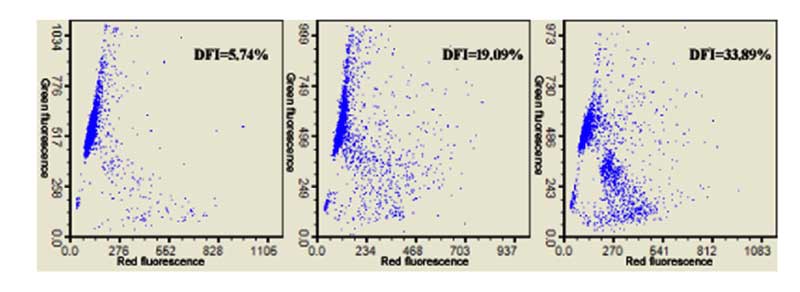What is a DNA Fragmentation Assay?
A DNA Fragmentation Assay, also known as a sperm DNA fragmentation test, is a laboratory test that measures the level of DNA damage in sperm cells. This test provides an assessment of sperm DNA integrity, which is important for successful fertilization and healthy embryo development.
There are different techniques used to assess DNA fragmentation, including:
- TUNEL Assay (Terminal deoxynucleotidyl transferase dUTP nick-end labeling): This technique detects DNA strand breaks by labeling the terminal ends with fluorescent dUTP molecules. It measures the amount of fragmented DNA in sperm cells.
- SCSA (Sperm Chromatin Structure Assay): SCSA assesses DNA fragmentation by denaturing the sperm DNA and labeling single-stranded DNA with a fluorescent dye. Flow cytometry is then used to measure the fluorescence, indicating the extent of DNA fragmentation.
- Comet Assay (Single Cell Gel Electrophoresis): In the comet assay, sperm cells are embedded in a gel matrix and subjected to electrophoresis. Damaged DNA migrates more easily, forming a “comet tail,” while intact DNA remains in the “comet head.” The length of the comet tail indicates the degree of DNA fragmentation.
- SCD (Sperm Chromatin Dispersion): SCD measures DNA fragmentation by assessing the dispersion of sperm chromatin. The sperm cells are mixed with an acid solution that breaks down the DNA, and the resulting halo-like structure indicates the level of fragmentation.
These tests provide a quantitative measurement of DNA fragmentation by assessing the percentage of sperm cells with damaged DNA or the extent of fragmentation within the sperm population.
A DNA Fragmentation Assay can be useful in identifying potential causes of male infertility, determining the need for specialized treatments, and predicting the success of assisted reproductive techniques. It helps healthcare professionals tailor treatment plans by targeting sperm DNA integrity and improving chances of conception.
If you’re considering a DNA Fragmentation Assay, it’s recommended to consult with a healthcare professional or a fertility specialist who can guide you through the process, interpret the results, and provide appropriate recommendations based on your specific circumstances.

Importance of DNA Fragmentation index in male infertility
Introduction:
When it comes to reproductive health and fertility, the integrity of sperm DNA is crucial for successful fertilization, embryo development, and ultimately, the creation of a healthy offspring. There are multiple techniques including Sperm Chromatin Structure Assay (SCSA) which has emerged as a valuable tool in assessing DNA fragmentation of sperm. In this blog, we delve into the significance of DNA fragmentation analysis using SCSA and its impact on male fertility.
Understanding DNA Fragmentation:
Before we delve into the importance of DNA fragmentation analysis, let’s briefly explore what it entails. DNA fragmentation refers to the breakage or damage of DNA strands in sperm cells. This fragmentation can occur due to various factors, including oxidative stress, aging, environmental toxins, infections, lifestyle choices, and genetic abnormalities. While some degree of DNA damage may be normal, excessive fragmentation can impair sperm function and reduce fertility potential.
The Role of SCSA:
Sperm Chromatin Structure Assay (SCSA) is a powerful laboratory technique that measures DNA fragmentation levels in at least 5000 sperms. It evaluates the susceptibility of sperm DNA to acid-induced denaturation, enabling the identification and quantification of damaged DNA strands. By utilizing flow cytometry, SCSA provides valuable insights into the quality and integrity of sperm DNA.
Importance of DNA Fragmentation Analysis:
- Assessing Male Fertility Potential: DNA fragmentation analysis using SCSA offers valuable information about male fertility potential. High levels of DNA fragmentation have been associated with reduced fertilization rates, impaired embryo development, and increased miscarriage rates. By assessing DNA fragmentation, reproductive specialists can better understand a couple’s fertility challenges and determine appropriate treatment strategies.
- Predicting Assisted Reproductive Techniques (ART) Outcomes: For couples undergoing assisted reproductive techniques such as in vitro fertilization (IVF) or intracytoplasmic sperm injection (ICSI), DNA fragmentation analysis can be instrumental in predicting treatment outcomes. Research has shown that higher levels of DNA fragmentation in sperm are associated with lower implantation rates, poorer embryo quality, and decreased pregnancy rates. By identifying individuals with high DNA fragmentation, healthcare professionals can optimize treatment protocols, such as selecting suitable sperm for ICSI.
- Tailoring Treatment Approaches: DNA fragmentation analysis can aid in tailoring treatment approaches for couples facing fertility challenges. For example, if high levels of DNA fragmentation are detected, interventions to reduce fragmentation can be recommended. Lifestyle modifications, nutritional supplements, and antioxidant therapies have been shown to improve sperm DNA integrity in some cases. By addressing the underlying causes of DNA damage, couples can potentially enhance their chances of successful conception and healthy pregnancies.
